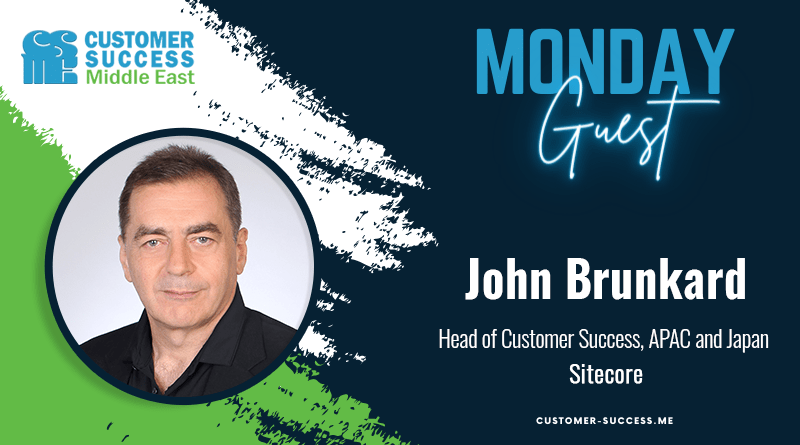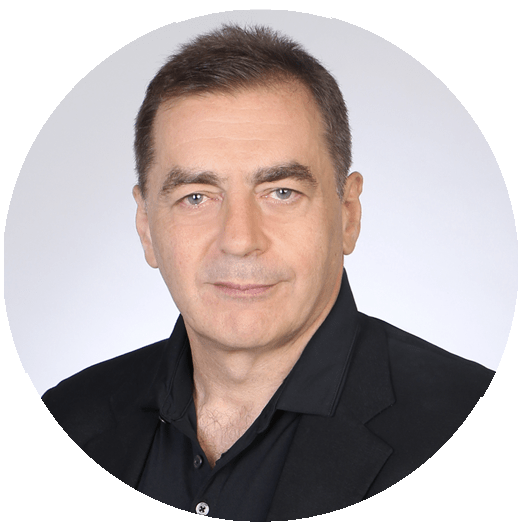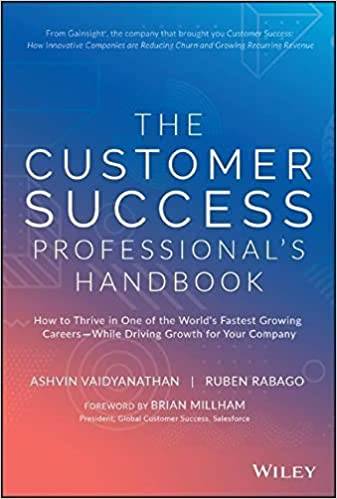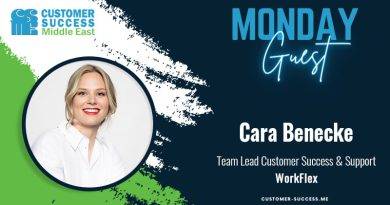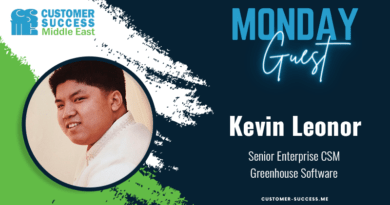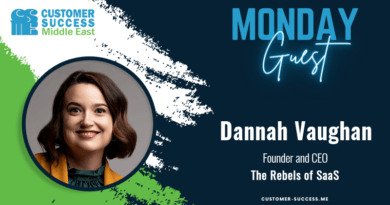Monday Guest John Brunkard
Get to know John Brunkard
By: Mohammed Alqaq | June 19, 2023
It is very nice to (e)meet everyone here. I am originally from Dublin – Ireland, however the tropical city of Singapore has been my home since 1995. All of my professional career has been working in the Asia Pacific and Japan region. I have been married for 25 years and have two boys, ages 22 and 15. In my free time, I like to spend time with my family, work out in my home gym, go swimming or go for a cycle. Recently I started taking my dog for agility sports.
I am currently leading the Customer Success Team for APAC & Japan at Sitecore – the leading provider of an end-to-end composable digital experience platform, that empowers brands to make unforgettable connections with their customers. I am also part of the APJ and Global Customer Success Leadership teams.
I am passionate about Mentoring and Coaching; in particular for those that are new to Customer Success and/or new to being a people manager. I have three coaching arrangements in progress at the moment. I’m a Customer-Led Growth Advisor to Catalyst Software, a Top 100 CS Strategist awarded for 2021 and 2022 by SuccessHACKER.
As someone who believes in Continuous Learning & Development I have completed various certifications over the years from a Master Degree in Management of Technology, Project Management Professional (PMP), ITIL Expert, Certified Customer Experience Professional (CCXP) and Customer Success.
We asked John to take us through a journey telling us about his career path, how he spends his workday, what advice he can share with someone starting as a customer success manager, and many other questions.
Enjoy reading this interview
Tell us about your career path?
It is a long one 🙂
I graduated with a Bachelor of Science Degree in Engineering – Electronics / Telecommunications / Computers from Trinity College Dublin, Ireland. My first job was with a Japanese company called Konami in Kobe, Japan. I was working in their R&D department researching the use of Digital Signal Processors for Surround Sound.
Through contacts, I had the opportunity to join a fast-growing US company (Dialogic) as the third employee in Asia and the first technical resource. That was an exciting change for me and my first foray into a customer-facing role. I spent 4 years working for Dialogic in Japan, initially supporting Japanese customers and then customers throughout the rest of APAC.
Working in Japan, I learned the importance of absolute focus on the customer as well as attention to detail and quality.
I moved with Dialogic to Singapore to set up the Customer Support Center for APAC. That was when I first became a people manager and team builder. Dialogic’s leadership mantra was “Our Customer’s Success is our Success”.
Dialogic was acquired by Intel in June 1999. At that time, Intel was acquiring many companies in its quest to become ‘the building block supplier to the Internet Economy’.
“Our Customer’s Success is our Success”.
After integration, Dialogic became part of the Communications Platform Group. Due to a change of strategy in the Customer Support model, I decided to move on.
However, instead of leaving Intel, I joined the IT Department. My time with IT@Intel was creating & leading a Global Project Management Office for internal projects within a team called Contact Center and Telecom Solutions.
While at Intel, I received excellent management & leadership training. I also became a volunteer instructor in courses such as; Coaching Skill Workshop and Leading Successful Projects. Intel sold off the Dialogic business around Nov 2006 to a company called Eicon Networks which changed the combined company name to Dialogic (version 2).
I was asked by the new company leadership to join (return) and rebuild the APAC+Japan Customer Services & Support organization. I applied many of the key concepts I learned from running a PMO & Successful Project to this new organization. These are quite similar to what we do in the Customer Success world; Customer onboarding, providing jump-start services and training, focus on time too (first) value, product/feature adoption, and being outcome focussed.
After 2½ years with Dialogic 2.0, I had an opportunity to join a large and well-known software company to lead their Product Support for APAC however this role did not work out. I learned some hard lessons from this experience. I left that company to focus on family and health. The timing was not good – a Global Recession, so I ended up being out of work for about 15 months. During this time I completed my ITIL v3 Certifications up to Expert.
In Sept 2011 I joined Blue Coat Systems – a leading CyberSecurity Company to become Director of Customer Support for APAC. This is where I came across the concept of Team One (based on a book called The 5 Dysfunctions of a Team by Patrick Lencioni).
In August 2016, Blue Coat was acquired by Symantec. After the two Support organizations were integrated together I became the overall head of Technical Support for APAC. This was the largest team I managed about 130+ with large teams in Kuala Lumpur (Malaysia), Pune (India), and Dalian (China). It was quite a challenging and demanding role.
I left Symantec in August 2018 and took a short break. Thereafter, I joined a Telecom Start Up in Nov 2018. The challenge was to go back into building mode and create something from the ground up. One of the key attractions of the role was that I was given full responsibility for the end-to-end Customer Lifecycle.
The company had an innovative 5G solution that used laser technology from Lockheed Martin (Space). The initial plan was to Go To Market in Asia with Singapore being the focal point.
However, after a change in CEO, the strategy changed to go USA mainland first, resulting in the closure of the Singapore office. The company did not last much longer.
At this time I decided my next role would be a Software SaaS company where I could be in a pure Customer Success role. I came across an opportunity with Red Hat. Although it was a smaller role than previous roles …and less pay I decided to give it a go …build up my capability, competency, and personal brand in Customer Success.
After 2 ⅔ years I decided it was time to move on and get back into an APAC Leadership role where I would also be a part of the Global Customer Success Team. There were several opportunities available at the time.
I decided Sitecore was the best choice for me; Clear focus on Customer Success & Customer Led Growth, a place where I could add value at a strategic and leadership level, Products focused on delivering great customer experiences, a strong and compelling company vision, and mission, and very importantly excellent rapport & alignment with the hiring manager (Global VP of Customer Success & Renewals) and the Chief Customer Officer.
How did you join Customer Success?
Throughout my career, I have been in Customer Facing roles and most organizations have a focus on their Customer’s Success. In the Customer Support teams I lead, we typically took a more holistic view of customer issues rather than just closing the support case.
Rather than just focus on issue resolution we took a broader look at customer outcomes. The Support Engineers used a consultative approach asking questions to understand the full context and desired outcomes of the customer. They would also check if there were other related areas or concerns where they could assist. So there is an element of evolution towards a pure Customer Success role to get me to where I am now.
From a pure Customer Success and SaaS subscription business model then that would be Red Hat and now Sitecore.
How would you describe the ideal CSM candidate?
In hiring for any role I always look for a great attitude, aptitude, values alignment and culture add. I look for people that have a growth mindset and intellectual curiosity, those that want to continuously learn, develop and improve.
While at Red Hat and subsequently at Sitecore we adapted a framework of Customer Success Competencies and their accompanying behaviors. The competency framework defines the key skills, disciplines, and behaviors needed for effective performance in the Customer Success role. When interviewing candidates these are the areas we evaluate.
The competencies are;
– Emotional Intelligence matters because it means having an awareness of how emotions can dictate decisions and actions, which can then have real-world implications.
– Model Behaviors refer to approaching customers, peers, and work output with the right ethic and open-mindedness, to achieve results and grow.
– Entrepreneurship and strategy refer to employing customer-oriented approaches to achieving desired outcomes and possessing the mindset and “sense” required to understand and process unique business situations.
– People and Teamwork refers to the abilities related to working with and managing the relationships and communications with CSMs internally, and also within customer organizations.
– Continuous Learning, or actively pursuing learning and self-development opportunities, is something that separates the mediocre Customer Success teams from the stellar, high-performing one
– Drive refers to having the ability and desire to achieve and own results whether good or bad. Customer Success professionals are responsible for their own autonomy and need to be self-motivated to hit their goals and deliver results
What one piece of advice would you give to someone just starting out as a Customer Success Manager?
I have a few. You own your career, so set short-term and long-term objectives to progress on your career path. Treat feedback as a gift. Learn as much as you can about Customer Success and the Subscription Business Model from various resources such as books, podcasts, online training, and talking to other CSMs.
Look for opportunities to be coached by those that have more experience and expertise than you. Engage a mentor to guide you throughout your career journey.
You own your career, so set short-term and long-term objectives to progress on your career path!
Can you take us on a journey describing what your workday looks like?
In my role, I mainly focus on strategic objectives spanning my team and the global Customer Success team. I support my team through coaching and facilitation helping to remove any barriers and overcome challenges and issues.
🙂 While no two days are the same I do have some patterns of business activity over the week.
I get up around 6:45 am and do some light stretching. Then I take my dog Keila for a walk/run of about 45 minutes. This is a great start to the day.
I generally start work around 8:30 am. I do a quick review of my schedule for the day, check on follow-up action items (important) from the previous day (coming in overnight from other timezones), and check on any actions required from Australia which is 2 or 3 hours ahead of Singapore.
I have several standing meetings in the week including Sales Forecast on Mondays, my CSM team meetings on Tuesdays (alternate between my direct team and extended team), bi-weekly APJ Leadership meeting, and Support Escalation Call on Thursdays.
Throughout the week I have 1:1 meetings with direct reports and bi-weekly with my CSM and Team One Peers. I have regular meetings with other key stakeholders across the business which could be in the early evening or night time.
Of course, I have customer meetings that I participate in depending on the context and situation. For my projects or planning I block chunks of time in my calendar where I can work exclusively on those tasks.
I try to take a break mid-day to go for a swim or a workout late afternoon before my evening and nighttime call. I block off time in the evening between 6:30 pm and 8:30 pm for family time.
I spend some time wrapping up for the day or in meetings before ideally going to bed between 10:30 and 11:00 pm. 🙂
What makes you feel inspired or motivated?
Great question. Some examples are;
– When the team works together collaboratively to successfully turn around a difficult and challenging customer situation. Solving customer problems and getting them back on track to achieve their desired outcomes.
– When the team not only meets important objectives/Key Performance Indicators but also exceed expectations ahead of time.
– When my CSMs receive unsolicited positive feedback or recognition for their work from our customers and / or sales team members.
– At a personal level; when I am able to help the people I am coaching and mentoring.
What’s one thing that people are generally surprised to find out about you?
My resting heart rate (~52 bpm) OR Both my wife (Triathlon) and youngest son (Rollersports Inline Speed Skating) have represented Singapore 🇸🇬 in International Sport competitions. My son just got selected to represent Singapore 🇸🇬 in the Asian Games which takes place in China from 23rd September.
Who do you look up to the most?
Actually no one person in particular. I have received inspiration and wisdom from several people over the years.
What are your top 3 priorities now?
– Wellness: Maintaining my physical, mental, emotional and spiritual health.
– Important work project at Sitecore– “Operationalizing the Customer Lifecycle across the company” and FY24 Strategic Planning
– Obtain ICF Accredited Coach Certification. I’ve been mentoring and coaching for several years now. I should obtain professional certification.
What advice would you give to Customer Success Managers to grow and develop their careers?
Similar answer to question #5. I also recommend participating in good Coaching / Mentoring programs such as the ones from Catalyst Software Coaching Corner and the CS Network Mentoring Program.
What’s your favorite book, and why?
Hmm.. that is a tough one. I’ve no single favorite book. I do like autobiographies and leadership books. I listen to books using the Audible app. I would not get through so many books otherwise.
Recent books listened to in the last 3 months or in progress are;
- Surrender: 40 Songs, One Story – by Bono (U2 Singer),
- Ghost Rider: Travel on the Healing Road – by Neil Peart (Rush Drummer),
- Originals: How Non-Conformist Change the World – by Adam Grant,
- I Love it here: How Great Leaders Create Organizations Their People Never Want to Leave – by Clint Pulver
- LoonShots: How to Nurture Crazy Ideas that win wars, cure diseases and transform industries – by Safi Bahcall
- Discover Your True North: Expanded and Updated Edition – by Bill George
- The Heart of Business: Leadership Principles for the Next Era of Capitalism – by Hubert Joly.
..to name a few. The one book I recommend for people new to Customer Success or thinking about becoming a Customer Success Manager is; The Customer Success Professional’s Handbook: How to Thrive in One of the World’s Fastest Growing Careers – While Driving Growth for Your Company – by Ashvin Vaidyanathan , Ruben Rabago
» Check out the 10 Books a CSM should read to advance and improve their skills.
Have you had your “I’ve made it” moment yet?
I would say that I have not and don’t think I ever will. I believe in continuous improvement, development, and learning. However, there are several things that I have accomplished in my lifetime that I am quite pleased with.🙂
What should I have asked you but didn’t?
You’ve asked some great questions. How about? – If you could start all over again, would your career path take a different direction?
Where can people go to find out more about you?
I would love to connect and engage with people on LinkedIn.
Thank you, John, for sharing your knowledge and for the opportunity to know you more.
Do you have a Customer Success Leader, Expert, or Influencer you would like to know more about?

